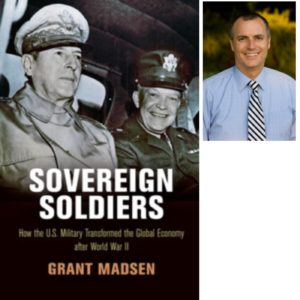Category: Japan
Early US diplomatic history book – “Raising the Flag” (University of Nebraska Press, 2018) – Peter Eicher interview
Podcast: Play in new window | Download
Subscribe: RSS
 Peter Eicher spent many decades working in the US Foreign Service. He’s always been interested in history and after he retired he began writing on the history of US diplomacy. I interviewed him about his latest book “Raising the Flag.”
Peter Eicher spent many decades working in the US Foreign Service. He’s always been interested in history and after he retired he began writing on the history of US diplomacy. I interviewed him about his latest book “Raising the Flag.”
After our interview he wanted to make sure this story was mentioned:
Of course, after we hung up, I thought of the most significant instance of diplomatic-navy coordination recounted in the book — the effort to free American prisoners held in Tripoli during the first Barbary War, and to negotiate peace with the ruler. More than 300 officers and men from the USS Philadelphia had been captured when the frigate ran aground in Tripoli harbor. Tobias Lear (once George Washington’s private secretary) was commissioned to negotiate peace and release of the prisoners, in close coordination with a military campaign to put pressure on the Tripoltanians. The campaign included naval action and a land campaign in which William Eaton, erstwhile U.S. consul in Tunis, appointed himself as a general and led a land attack across the desert with a ragtag army of Arabs and mercenaries, plus eight U.S. Marines, to capture the western Libyan town of Derne. This was the famous “to the shores of Tripoli,” which I did mention in our talk. Lear eventually negotiated the peace and release of the prisoners, on substantially better terms than the government in Washington was prepared to accept.
1:45 – Peter Eicher discusses how he got into history. He enjoyed studying it and joined the US Foreign Service.
3:32 – His first book was Emperor Dead, another diplomatic history. Raising the Flag discusses about the first 70 years of US diplomatic history. Many diplomats were taken to their posts by US Navy ships. He has a chapter about the Barbary Coast and US diplomacy.
8:22 – At this time, US diplomats were given vague orders and often left on their own. Diplomacy changed radically after the US Civil War.
10:11 – Part of the book deals with consuls stationed in areas that are now part of the US. That includes California when it was Mexican.
15:01 – It was difficult for Washington DC to monitor how well diplomats were doing what they were supposed to do.
16:45 – The US’s first diplomat in Argentina and Chile also served as a General in the Argentinian military against Spanish Royalists.
18:17 – In many ways, diplomats and consuls were working a part-time job.
20:38 – Edmund Roberts used a Naval vessel to do his diplomatic work in Southeast Asia and Malaysia. He had the Navy threaten to bombard a Malaysian city because they harbored pirates. There was a lot of naval gunboat diplomacy at the time.
26:30 – The Navy was reformed after the Revolution to deal with the Barbary pirates. It wasn’t disbanded after the Barbary War.
29:40 – The National Archives hold all the main diplomatic correspondence since the nation was formed. However handwritten letters on microfiche can be hard to read.
31:30 – Many of these diplomats knew they were making history so they wrote a lot of reports on their work.
35:05 – The State Department had developed a report style that diplomats were supposed to use. Former Commodore David Porter was regularly reprimanded for not using that style.
40:09 – The diplomat at Monterrey wrote that ships docking in California would lose crews to the gold rush. Many of the diplomats then were dealing with the same trade issues that we deal with today. This includes war in the Middle East, tensions with Turkey and Mexico, trade problems with China.
42:20 – Mr. Eicher’s book contains stories and people that history buffs will never have seen or heard of before. For example, he found information on Daniel Clark who had a lot to do with the Louisiana Purchase and he found many details that historians haven’t discussed before.
45:30 – His stories have swashbucklers, heroes, villains and intrigue. The book is not a general history but is rather a story book of very interesting events with important lessons and morals.
47:45 – One of the most difficult tasks was reading the writing of these early diplomats.
55:45 – A future project may be a book on Americans in France.
For more “Military History Inside Out” please follow me on Facebook at warscholar, on twitter at Warscholar, on youtube at warscholar1945 and on Instagram @crisalvarezswarscholar
Guests: Peter Eicher
Host: Cris Alvarez
Tags: military, history, military history, conflict, war, interview, non-fiction book, Barbary, China, Turkey, Commodore Porter, American Revolution, Civil War, gunboat diplomacy, Japan, Louisiana Purchase, California, gold rush, Mexico, Washington DC, US Navy
Cold War history book – “Sovereign Soldiers” (University of Pennsylvania Press, 2018) – Grant Madsen interview
Podcast: Play in new window | Download
Subscribe: RSS
 Dr. Grant Madsen has long been interested in history and this led him to earn a PhD in History. Sovereign Soldiers is his first book and explains how the US military transformed the global economy with the economic policies it applied to the occupation of Germany and Japan after WWII.
Dr. Grant Madsen has long been interested in history and this led him to earn a PhD in History. Sovereign Soldiers is his first book and explains how the US military transformed the global economy with the economic policies it applied to the occupation of Germany and Japan after WWII.
2:03 – Dr. Madsen talks about how he got into studying and writing about history. He grew up with historians and he felt he made sense of the world historically. He decided to get a PhD in history and the book stems from his dissertation research.
5:10 – Dr. Madsen talks about the details of the book. After WWII, the US military men found that they needed to understand how to run the economies of Germany and Japan. Joseph Dodge was instructed to fix the economy of Japan.
7:28 – There is agreement that these military leaders succeeded in developing the occupied territories and helped the economy of the West. Dr. Madsen examined economic theories and practice in his research.
9:43 – Economic stability seemed to be the key to success. Dr. Madsen feels there was no Keynesian approach to how these economies were developed.
12:03 – The military had economic policies in place as soon as the occupation periods started. These policies were based on New Deal policies but disappeared over the time of the occupations. Germany had cartels and Japan had zaibatsus which had to be worked with to develop these economies.
15:28 – The military dropped its military economic policies quickly in Germany and used a new approach to build that economy. Japan took a little longer to develop.
17:24 – Though the US held all military power in Japan and Germany, it wasn’t useful in imposing US economic will. Clay in Germany and MacArthur in Japan had to be careful on how they used their military power.
20:48 – About 1947, the US military was focused on making Japan and Germany capable of helping to resist the Soviets.
22:46 – There was a fight between State and Defense on who would pay for the occupations. The military was stuck with the bill. Many military leaders didn’t want to be blamed for failure in the occupations since they didn’t think they would succeed. They didn’t want to look bad like it had in earlier decades.
26:06 – In 1947-48, the US strategically decided to make Germany and Japan perimeter defenders against the Soviets. The initial plan was to jointly control Germany with four nations to create worldwide peace and cooperation, but by 1947, Germany became a country that would be a perimeter. Military bases became a way to funnel US money into Germany and Japan.
30:38 – The book starts with the Spanish-American War where the US begins controlling other territories. The US had governance issues when they planned to stay in places only temporarily. The book first focuses mainly on the Philippines during the early occupation. The middle chapters talk about Germany and Japan. The final chapters focus on Eisenhower’s military-economic focus.
35:41 – Joseph Dodge left many useful historical papers to the Detroit Public Library. Mr. Madsen also used the various Presidential libraries for his research. The Eisenhower address took on a different tone as he did his research.
40:36 – One question Dr. Madsen had was how were US leaders using the word democracy. He decided that the word was a stand in for the term economic policy.
43:44 – It’s around WWI that countries realize that military power and industrial economy became strongly linked. Eisenhower jumped up in the ranks quickly because he understood combined arms and industrial conversion of a peacetime economy to a wartime economy.
47:19 – Right after the war, the US and the Soviets discussed what economic system they would impose on Germany. The Soviets planned to just let the Germans starve and had no plan for an economic system there. By 1947, the Soviets imposed communism since they saw they had to grow East Germany to counter the West.
51:28 – In 1950, the Japanese economy was struggling and an anti-American Prime Minister was elected. This was when the US changed course in Japan.
53:11 – Dr. Madsen hopes that the book changes how historians discuss the post war period. Peacekeeping operations are much more common than wartime operations so this is an important subject to study in regards to war and the history of military nation building and peacekeeping.
59:21 – His website is grantmadsen.net.
Links of interest
For more “Military History Inside Out” please follow me on Facebook at warscholar, on twitter at Warscholar, on youtube at warscholar1945 and on Instagram @crisalvarezswarscholar
Guests: Grant Madsen
Host: Cris Alvarez
Tags: military, history, military history, conflict, war, interview, non-fiction book, spanish-american war, Philippines, Germany, Japan, MacArthur, Eisenhower, Soviet Union, economy, military-industrial complex, Keynesian
